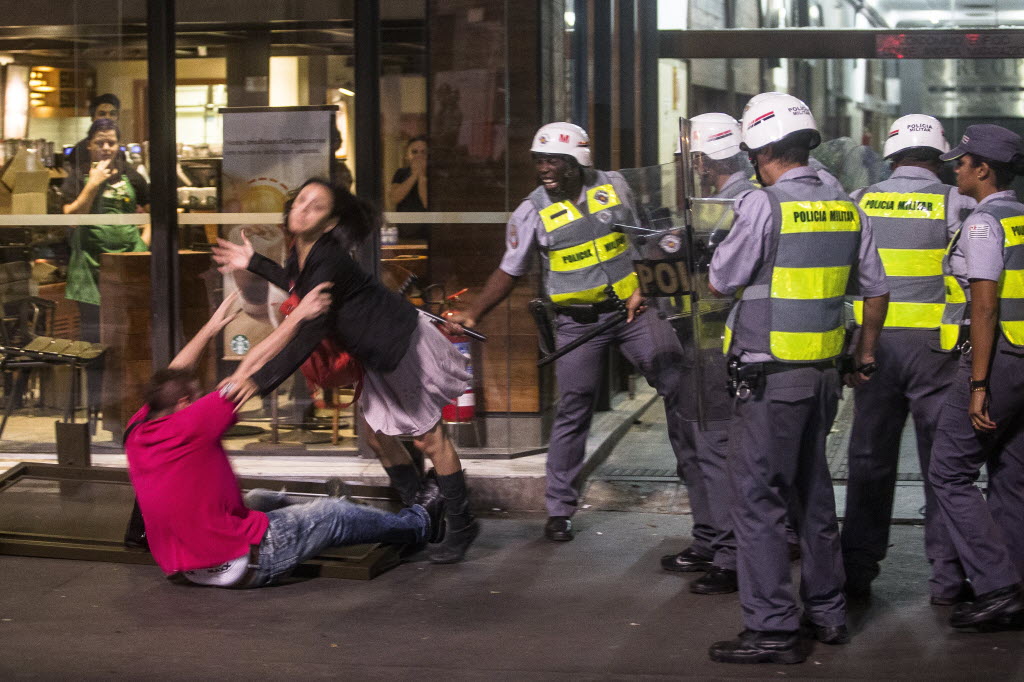One officer speaks out about death squads and a public backlash against a police system they know is broken. Above, the Folha cover photo which helped to spur on Brazil’s June protests.
Of all the complex and sometimes contradictory consequences of the demonstrations in Brazil since June, the clearest lesson may have been that the country’s police forces are woefully lacking. Obviously clueless as to how to deal with protesters, widely and credibly accused of torture and summary executions in poor neighborhoods, and terrifying to behold, it seems the military police are simply not to be trusted. At least, that’s what 70% of Brazilians think, according to a recent poll.
Lieutenant Colonel Adilson Paes de Souza, who worked as a military cop for 28 years, completed a master’s degree in human rights, and is now launching a book, gave an interview this week in which he issued a harsh indictment of the current system. “If on one hand we have a [system that’s] proven to be ineffective, and on the other hand we have proven brutality, something has to change.”
Below are translated excerpts from the interview with Folha.
Folha – What is behind the violent protests against the PM [policia militar] seen recently in São Paulo and Rio?
Adilson Paes de Souza – A large part of society is saying: This model we have in place is not effective. And they’re saying this in a violent way. Society has no one else to turn to. I’m not saying that violence is a legitimate way to respond to [police] violence, but that it may be the only way to be heard and noticed.
How can a good-natured guy leave Military Police training and then become a murderer in a death squad?
I interviewed soldiers involved in death squads. They don’t believe in the system. They ask themselves: why am I going to take this person into prison to the Civil Police if they’ll be immediately released after paying a bribe? “I risk myself, take him in, and he is freed?” They decide to arrest, accuse, sentence, and kill.
How do these police officers deal with murder?
Murdering those on society’s margins is seen as an important part of their job. They’ve come to declare that if they aren’t allowed to kill, they wouldn’t be able to work. That’s the logic of the National Security doctrine, according to which we’re dealing with enemies. And on the battlefield, you have to annihilate the enemy.
How does it come to this?
[Those accused of murder] said that before they were imprisoned they were seen as examples of good police officers. Front line guys. “I was awarded officer of the month. I won a medal,” I heard one say. And, all of a sudden, they’re in jail. They didn’t get it.
Are you saying they were encouraged to be violent?
If they didn’t openly say, “You can kill and I’ll take care of you, I’ll cover you,” then there was some kind of indirect encouragement, there were awards for police violence. But the government doesn’t admit this.
A lot of social organizations defend the demilitarization of the PM. What do you think of this?
It’s a theme that leads to strong reactions. The facts prove that the current security model doesn’t work anymore. Data from the Secretary of Public Security show that only three out of 100 investigations of violent crimes lead to sentencing. On the other hand, the Military Police killed more people in five years than all North American police forces combined. If on one hand we have a [system that’s] proven to be ineffective, and on the other hand we have proven brutality, something has to change.
Minister Gilberto Carvalho says that the “black blocs” have to be understood and studied. What’s your opinion?
They have to be understood, yes. That doesn’t mean that they shouldn’t be punished. But what brings a group of people to get together and practice this type of action? Might it be that by not providing the basic social rights enshrined in the Constitution, the State has helped these groups to arise?


